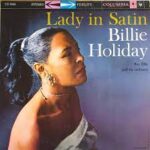 “Lady in Satin” is a jazz album by Billie Holiday, recorded in 1958 and released later that year. It’s considered one of her most melancholic and emotionally raw albums, as it was recorded near the end of her career, when her voice had become more fragile and vulnerable. Here’s a track listing for the album, along with a brief review of each track:
“Lady in Satin” is a jazz album by Billie Holiday, recorded in 1958 and released later that year. It’s considered one of her most melancholic and emotionally raw albums, as it was recorded near the end of her career, when her voice had become more fragile and vulnerable. Here’s a track listing for the album, along with a brief review of each track:
“I’m a Fool to Want You” – The opening track sets the tone for the album, with Holiday’s voice sounding frail and weary as she sings the heart-wrenching lyrics. The lush orchestration, arranged by Ray Ellis, provides a mournful backdrop for Holiday’s vocals.
“For Heaven’s Sake” – This ballad has a wistful, nostalgic feel that’s typical of Holiday’s later recordings. Her voice sounds more delicate than ever, but she still manages to convey a deep sense of emotion.
“You Don’t Know What Love Is” – This slow, bluesy tune is one of the album’s highlights. Holiday’s voice is filled with pain and longing as she sings the lyrics, and the orchestration adds a haunting, cinematic quality to the track.
“I Get Along Without You Very Well” – This ballad is one of the most beautiful on the album, with Holiday’s voice sounding vulnerable and fragile as she sings the heartbreaking lyrics.
“For All We Know” – This romantic ballad has a dreamy, ethereal quality that’s enhanced by the orchestration. Holiday’s voice sounds almost otherworldly as she sings the poignant lyrics.
“Violets for Your Furs” – This slow, atmospheric tune features some beautiful saxophone work from Ben Webster, who solos over the lush orchestration. Holiday’s voice sounds more delicate than ever, but she still manages to convey a deep sense of emotion.
“You’ve Changed” – This tune has a melancholic, bluesy feel that’s perfect for Holiday’s voice. The orchestration is spare and haunting, with a mournful trumpet solo adding to the emotional impact of the track.
“It’s Easy to Remember” – This romantic ballad is one of the album’s highlights, with Holiday’s voice sounding delicate and vulnerable as she sings the beautiful lyrics.
“But Beautiful” – This slow, atmospheric tune is a perfect showcase for Holiday’s voice, which sounds more fragile than ever. The orchestration is sparse and haunting, with a beautiful guitar solo adding to the emotional impact of the track.
“Glad to Be Unhappy” – This bluesy tune has a wistful, melancholic feel that’s typical of Holiday’s later recordings. Her voice sounds more delicate than ever, but she still manages to convey a deep sense of emotion.
Overall, “Lady in Satin” is a haunting and deeply emotional album, showcasing Billie Holiday’s unique talent for conveying deep emotion through her voice. The orchestration, arranged by Ray Ellis, is lush and cinematic, providing a perfect backdrop for Holiday’s vocals. While the album may not be for everyone, it’s a must-listen for fans of jazz and vocal music, as well as anyone interested in exploring the deeper emotions of the human experience.
This post has already been read 82 times!

























